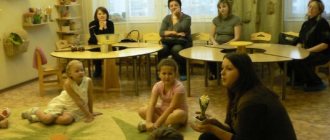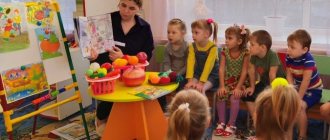Consultation for teachers “How to properly start communication with parents of students in kindergarten”
The conversation with parents should end with a farewell ceremony.
When saying goodbye to the parent, the teacher should, addressing him by name and patronymic, thank him for the conversation, express his satisfaction with it, see the parent off and say the words of farewell kindly and with a smile.
Conducting a conversation by the teacher at the initiative of the parents.
1. Establishing consent to contact.
(Participants in the dialogue discuss the time it will take place.)
Imagine the situation: Your mother’s visit was unexpected for you. You don't have time to talk to her. What will you do?
Having shown maximum attention and consideration to the mother, the teacher, instead of avoiding dialogue, should inform her that he did not know about her arrival and has planned a very important matter that cannot be postponed, and has time in ... minutes, if the mother is satisfied with this, then we can talk if no, then he will listen to her at any other time convenient for her.
Thus, the teacher makes it clear that he wants dialogue, despite unfavorable circumstances.
1. Listen to the parent. Allow the parent to let off steam. Remember that in fact, aggression is not directed at you, but at the image that your parents have. You should mentally separate yourself from this image and, observing the conversation as if from the outside, try to understand what lies behind the aggression, what worries the parent? It is important not to respond to aggression with aggression, because otherwise the situation may become uncontrollable.
Watch your posture!
The teacher’s expression of sympathy and understanding of the parents’ experiences: “I see that you are concerned about the behavior of (child’s name), “I’ll try to understand you...”, “Let’s figure it out together” - will give the conversation a constructive character, which will help to find out the true reason for contacting the teacher.
The teacher should not miss the fact that the parent comes with certain facts. The teacher’s task is to determine the degree of validity of these facts.
The inconsistency of these facts can be proven only with the help of convincing arguments. The teacher’s ability to use objective, well-founded arguments increases his competence in the eyes of parents.
All parent questions must be answered. This helps move the conversation to a business level of communication and clarify all the other “pain points” of the parent in the area of upbringing and development of his child.
The conversation should also be ended at the initiative of the teacher.
When communicating with parents, you need to remember that communication has its own patterns. The basis of a person’s attitude towards us is laid in the first 15 seconds! In order to safely pass through the “barrier”
these first seconds, you need to apply
the “Rule of Three Pluses” (to win over your interlocutor you need to give him at least three psychological pluses)
.
Individual forms of work with parents.
The advantage of this form of work with parents is that through studying the specifics of the family, conversations with parents (with each individual), observing the communication of parents with children, both in a group and at home, teachers outline specific ways of joint interaction with the child.
Pedagogical conversations with parents. Providing timely assistance to parents on one or another issue of education. This is one of the most accessible forms of establishing communication with family. The conversation can be either an independent form or used in combination with others, for example, it can be included in a meeting or family visit.
The purpose of a pedagogical conversation is to exchange opinions on a particular issue; Its peculiarity is the active participation of both the teacher and parents. Conversations can arise spontaneously at the initiative of both parents and teachers. The latter thinks through what questions he will ask the parents, announces the topic and asks them to prepare questions to which they would like to receive an answer. When planning the topics of conversations, we must strive to cover, as far as possible, all aspects of education. As a result of the conversation, parents should gain new knowledge on the issues of teaching and raising a preschooler. In addition, conversations must meet certain requirements: • be specific and meaningful; • give parents new knowledge on issues of teaching and raising children; • awaken interest in pedagogical problems; • increase the sense of responsibility for raising children.
As a rule, the conversation begins with general questions; it is necessary to provide facts that positively characterize the child. It is recommended to think through in detail its beginning, on which success and progress depend. The conversation is individual and addressed to specific people. The teacher should select recommendations that are suitable for a given family and create an environment conducive to “pour out” the soul. For example, a teacher wants to find out the features of raising a child in a family. You can start this conversation with a positive description of the child, showing, even if insignificant, his successes and achievements. Then you can ask your parents how they managed to achieve positive results in their upbringing. Next, you can tactfully dwell on the problems of raising a child, which, in the teacher’s opinion, still need to be improved.
Family visit . The main purpose of the visit is to get to know the child and his loved ones in a familiar environment. By playing with a child, in a conversation with his loved ones, you can find out a lot of necessary information about the baby, his preferences and interests, etc.
The visit benefits both parents and the teacher: parents get an idea of how the teacher communicates with the child, have the opportunity in a familiar environment to ask questions that concern them regarding the upbringing of their child, and allows the teacher to get acquainted with the conditions in which the child lives, with the general atmosphere in the house, traditions and morals of the family. The teacher of each age group must visit the families of his pupils. Each visit has its own purpose.
The purpose of the first visit to the family is to find out the general conditions of family upbringing and to examine the child’s living conditions. Repeat visits are scheduled as needed.
When organizing a home visit, it is necessary to comply with the following conditions: • be tactful when visiting a family; • do not start a conversation in the family about the child’s shortcomings; • do not ask parents many questions about raising children; Make yourself a reminder about organizing home visits and try to follow it.
Individual consultations. Consultations are similar in nature to conversation. The difference is that a conversation is a dialogue between a teacher and a parent, and when conducting a consultation and answering parents’ questions, the teacher strives to give qualified advice. Individual notebooks, where the teacher records the children’s successes in different types of activities, parents can mark what interests them in raising their children.
These forms also include: • “Young Family School”; • execution of individual orders; • helpline; • Trust mail; • piggy bank of Good deeds, etc..
Individual forms of interaction with parents include:
1. An intimate conversation (can have a strong impact on parents, significantly change the attitude towards the teacher, the child, the concerns and affairs of the class. Parents are asked to think about what is important for teachers to take into account in raising their child, and prepare questions for the class teacher).
2. Execution of individual orders
3. Correspondence
4. Telephone conversation (it is necessary to agree on the terms of communication so that both parties do not have additional problems and inconveniences), etc.
The main goal of all forms and types of interaction between preschool educational institutions and families is to establish trusting relationships between children, parents and teachers, uniting them into one team, nurturing the need to share their problems with each other and solve them together.
8. Conditions for successful work of a preschool educational organization with a family.
The relationship between the preschool and the family should be based on cooperation and interaction, provided that the kindergarten is open inward and outward.
Partnerships with parents of students are relationships that will allow us to combine efforts to raise children and create an atmosphere of common interests.
A teacher who wants to establish constructive partnerships with parents must follow the principles:
1. Use positive communication skills. When communicating with parents, you need to ask and listen more than pointing or giving them advice. Parents should be frequently informed, both orally and in writing, about their child's progress and achievements, and individualized forms of sending information to and receiving information from families should be used. Before communicating to parents the goals and objectives of the educational program, you need to find out what they want, and also respond to parents' suggestions, ideas and requests in a timely and positive manner.
2. Providing family members with the opportunity to make choices and decisions. The educator helps family members summarize what they want for their children and for themselves. When planning and providing services, parents should be treated as the true experts on issues related to their children. The teacher gives parents the right to choose when, where and how they will participate in their child’s education.
3. Identifying and using the positive traits and strengths of the child and family. Parents should be informed about the child's strengths, accomplishments, and positive character traits through interviews, telephone conversations, notes, etc. Educators obtain information from parents about long-term goals, hopes, and aspirations for the future of their child and family; recognizes and expresses gratitude to parents for their unique contributions to their child's progress.
4. Respect for the diversity and uniqueness of families. It is necessary to accept and respect the opinions and feelings of parents, even if they do not coincide with our own, and try to develop an understanding of the cultural values of the families with whom we work.
5. Creating a friendly partnership between the kindergarten and the family. The teacher provides all family members with the opportunity to actively participate in group activities and does everything to make parents feel comfortable. Parents should be given the opportunity to participate in decisions regarding group activities.
At the present stage, partnership interaction between teachers and parents of preschool children is carried out mainly through:
— involving parents in the pedagogical process;
— expanding the scope of parental participation in organizing the life of an educational institution;
- parents attending classes at a time convenient for them;
— creating conditions for creative self-realization of teachers, parents, children;
- information and pedagogical materials, exhibitions of children's works, which allow parents to become more familiar with the specifics of the institution, introduce them to the educational and developmental environment;
— various programs for joint activities of children and parents;
- combining the efforts of a teacher and a parent in joint activities for the upbringing and development of a child: these relationships should be considered as the art of dialogue between adults and a specific child based on knowledge of the mental characteristics of his age, taking into account the interests, abilities and previous experience of the child;
- manifestation of understanding, tolerance and tact in raising and teaching a child, the desire to take into account his interests, without ignoring feelings and emotions;
— respectful relationship between family and educational institution. If educators want to encourage successful parent involvement, they need to establish active, ongoing, flexible, and positive communication with parents.
9. Creation of a unified educational space “Pre-Family”.
Refusal to use the unique experience of family education in the pedagogical process of kindergarten, rejection of the family and, as a consequence, passivity of parents leads to an impoverishment of the content of education.
A positive result can only be achieved when considering the family and kindergarten within a single educational space, implying interaction and cooperation between preschool teachers and parents throughout the child’s preschool childhood.
The most important feature of a unified educational space and at the same time a condition for its creation is the definition and acceptance by participants of the pedagogical process of common goals and objectives of educating preschoolers, which are formed in a unified program for the upbringing, training and development of children.
Modern education programs for preschoolers are built on the basis of the Concept of Preschool Education, achievements of psychology and pedagogy. However, parents who act as social customers of educational services often do not have in-depth knowledge in this area.
Therefore, the goal and objectives of public education should be the subject of detailed discussion by teachers and parents, during which the teacher needs to convey to the family his vision of the result of raising a child and reconcile it with the pedagogical attitudes of the parents.
The next sign and condition for creating a unified development space should be the development and acceptance of uniform requirements for the child at home and in preschool educational institutions. This helps not only to create psychological comfort for the child, but also to strengthen the authority of parents and teachers. An equally important feature and condition for creating a unified educational space is the development of a common approach to solving problems of education, the identification, generalization and coordination of pedagogical methods and techniques based on the study of the educational experience of the family and the transfer of information to parents about the technologies of the educational process.
Thus, modernity poses quite complex tasks for preschool educational institutions and places high demands on the professionalism of teachers.
Conditions of a single space of a preschool educational institution - family.
The federal educational standard for preschool education is aimed at solving the problem of providing psychological and pedagogical support for the family and increasing the competence of parents (legal representatives) in matters of development and education, protection and promotion of children's health. The content section of the educational program of preschool education should present the features of interaction between the teaching staff and the families of students. In the educational environment of the kindergarten, conditions must be created for the participation of parents in educational activities.
The kindergarten has developed its own system of interaction with the parents of pupils. In accordance with the results of the study of the parent contingent, work is carried out in the following areas:
— analysis of the level of psychological and pedagogical culture of parents (questioning, sociometry method, observations and analysis of the child’s interaction with parents).
— popularization of modern psychological and pedagogical ideas, providing parents with the necessary theoretical and practical information (open days, parent meetings (group, general, conference at the end of the school year, various forms of visual information in the corner for parents: booklets, recommendations, consultations, mailbox for questions, “repeat with the child”, “cook for the child”, “make with the child”, etc.) For children who do not attend preschool institutions, a short-term group for children aged 2-3 years is organized. Classes are held 3 times a week for two hours the entire school year.Narrow specialists work with children and parents: educational psychologist, music director, physical education instructor, speech therapist.
- the use of non-traditional forms of work with families of pupils - family meetings: master classes on making a product of artistic and aesthetic activity, training games “When you were little”, creation of joint projects “Space”, “Household Appliances”, “Cook”, “ Seller”, “Pets”, “Computer”, “How to build a house” and others, holidays “Russian song - Russian soul”, “Family Day”, “Olympiad”, “Defenders of the Fatherland”, “Health Day”, “Tasting dishes."
— bringing to parents interesting and useful information related to the life of children in kindergarten: advice from experts, a music and poetry corner; corner “Neboleyka”, exhibition “Do it with the children”, photo exhibition “The world around me”, Rainbow of success, “Today we did ...”, “We sincerely thank you”, “In the family circle”, Children’s creativity corner, “We live and live” .
— individual focus in working with parents (differentiated consideration of educational influences in a family environment, inclusion of parents in the pedagogical process, taking into account their individual interests and abilities);
— involving parents in the management of the kindergarten through participation in the work of the Conference, the parent committee, and the Council of Teachers.





